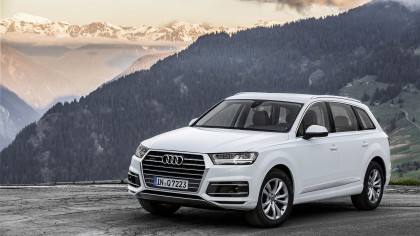New Audi cars know just how long that red light will last
Cars and cities start talking to each other

A few Audi cars are about to get smarter about traffic lights with the addition of a vehicle-to-infrastructure system.
Although the technology has been around for years in apps like EnLighten, Audi is the first automaker to market with a car-integrated system that allows the vehicles to talk to a city's infrastructure to get information about traffic lights.
"In the future we could envision this technology integrated into vehicle navigation, start/stop functionality and can even be used to help improve traffic flow in municipalities," said Pom Malhotra, Audi America General Manager, Connected Vehicles. "These improvements could lead to better overall efficiency and shorter commuting times."
Real-time traffic light information will be sent to Audi vehicles via on-board LTE connection, so you won't need your smartphone to be connected for it to work. Drivers will see a countdown on their instrument cluster or heads-up display.
Unfortunately, you'll have to pay for Audi's Connect Prime data subscription for the service to work, and at a cost of $199 (about £155, AU$260) for 6 months or $750 (about £585, AU$980) for 30 months, it's not cheap to know how long traffic lights will last.
Limited availability, for now
Traffic light information will eventually integrate with Audi's navigation system, allowing the car to calculate the fastest route with traffic signal data. The system will also provide data to cities to help decrease congestion.
The data would allow your car to tell you the optimal speed you need to maintain to hit every green light on a specific stretch of road. The system could also potentially warn drivers of power outages affecting certain intersections.
Sign up for breaking news, reviews, opinion, top tech deals, and more.
In short, it could vastly reduce the time you spend waiting at red lights, a drag for any commuter.

Only a few 2017 model-year Audi vehicles will get the vehicle-to-infrastructure system, including the Audi Q7, A4 and A4 allroad models built after June 1, 2016. Audi doesn't specify when other vehicles in its lineup will receive the system.
Hopefully other car makers will follow suit in offering similar systems to allow our future cars to become even smarter, and cut down on time waiting for lights to turn green.
- These are the 11 best apps to use in your car
